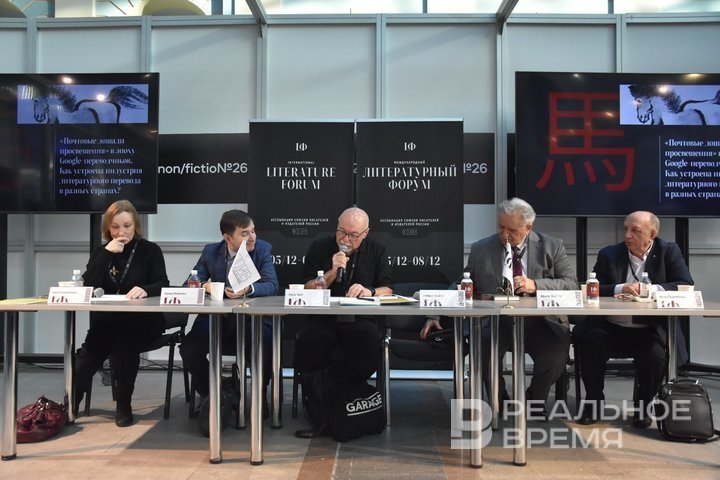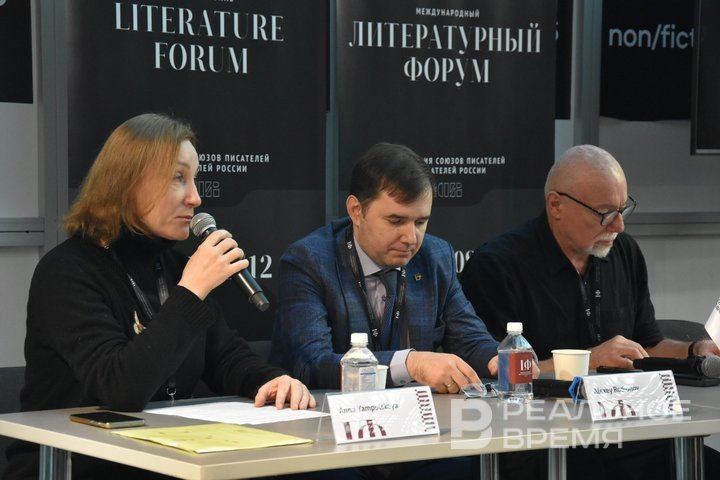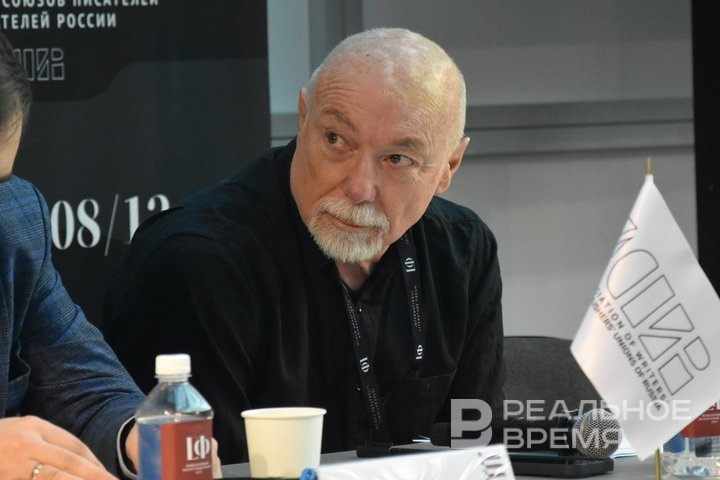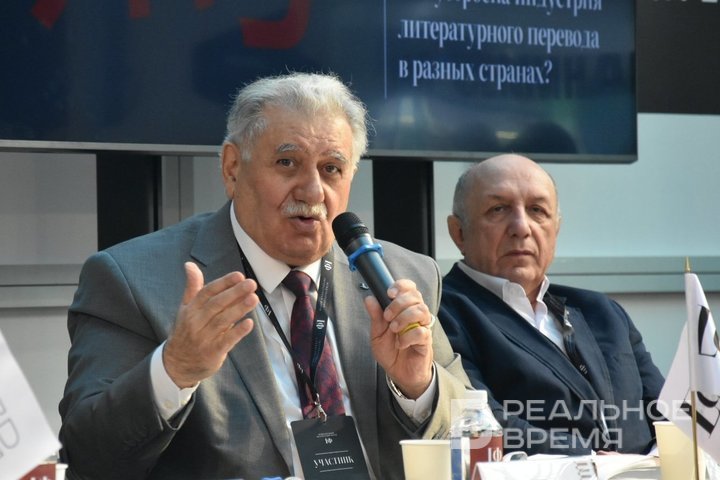Lost in translation: ‘hair of the dog’ in Italian, ‘cool’ drinks, and sexual subtext of Chinese
At the non/fiction№26 International Intellectual Literature Fair, they discussed how the art of literary translation is changing

The old world of dictionaries is giving way to the digital age. How do modern translators adapt to new tools and technologies? Why does translation from some languages, such as Chinese, remain a challenge for artificial intelligence, and what are the difficulties in translating the word “hair of the dog” into Italian? These have been discussed by translators from Russia, Italy, Abkhazia and Azerbaijan in the discussion “Postal Horses of Enlightenment in the era of google translators. How the literary translation industry works in different countries”.
Dictionaries vs libraries
The moderator of the meeting and an experienced translator, Anna Yampolskaya, began the discussion with a nostalgic digression into the past: “I remember when I was studying at the university and just starting to translate, one of my main concerns was to buy paper dictionaries. It seemed to me that every good translator should have as many paper dictionaries as possible.” Now everything has changed. Modern students have electronic devices and access to powerful databases instead of stacks of reference books on shelves, she says. However, this does not mean that the work has become easier. Yes, it takes less time to find quotes or verify facts, but at the same time, new challenges have arisen.
“Today, when I teach my students at the Literary Institute, I explain how to use the National Corpus of the Russian Language, Грамота.ру portal and other resources. But sometimes students bring a translation, and something is wrong with it. It turns out that they didn't translate it, but used Google Translator, and then they slightly polished up the result," Yampolskaya said.

But Alexey Rodionov, a professor at St. Petersburg State University and translator of Chinese literature, said that “there is no threat from artificial intelligence in terms of literary translation”. He also added that machine translation from Chinese is not very interpretable. According to Rodionov, automatic algorithms can be useful for technical texts, but in fiction they often create completely unexpected effects.
Rodionov shared a vivid example: “Machine translation has an amazing tendency to introduce sexual subtext where there is none in the original. For example, the phrase 'I knew that that friend had a hard time' turns into 'Yes, he also thought about gays'. This is a real case from Google Translate.”
But despite the comical mistakes, the role of machine translation in popularising Chinese online literature cannot be overestimated. Rodionov noted that thanks to clumsy automatic translations, thousands of Chinese novels have found their readers, and their success has pushed publishers to produce high-quality, professional translations. “Mòxiāng Tóngxiù, Tiānxià Guīyuán, and other authors attracted attention to Chinese literature through these imperfect translations.” This has created fandoms and an interest in serious works," added Alexey Rodionov.

Modern translation teaching methods not only include language learning, but also require students to develop critical thinking skills. Alexey Rodionov noted that the work of a translator is not easy to transfer text from one language to another. This is a search for cultural and stylistic equivalents, a balance between fidelity to the original and readability of the translation.
“There are many hints, double meanings, and stylistic features in the Chinese language. Machine algorithms are not yet able to cope with such tasks. While a human always looks for context, depth," Rodionov said. Learning to translate is becoming more difficult, but at the same time, more interesting. Today's students work with modern technology, but they face the same creative challenges as their predecessors.
An untranslatable word
Italian writer and translator Paolo Nori is known for his work on the translation of Russian literature. During the discussion, he shared his rather unusual experience. Nori's story about the translation of Venedikt Yerofeyev's novel “Moscow — Petushki” became a vivid illustration of the complexity of literary translation. “The most difficult translation I've ever done is the Moscow — Petushki novel. In this translation, the most difficult word was 'opokhmelitsya' (hair of the dog). We simply don't have a word or concept in Italy that can convey this cultural phenomenon," Nori said.

He recalled how he was in St. Petersburg 25 years ago and witnessed a scene that perfectly illustrated this concept. A woman in a St. Petersburg courtyard reached out her hand and asked for money to 'opokhmelitsya' (to have a drink to cure a hangover). To translate this scene, Nori had to come up with a long phrase that explains the emotional and physical state of the character: “Could you give me a few rubles so that I can buy something to drink to overcome the annoying feeling I have today because I drank too much yesterday?”
Nori noted that in an attempt to get closer to the original, cultural nuances arise that cannot be reproduced by machine translation. “I do not know how Google Translator would translate the word “opokhmelitsya”, but I am sure that the result would be far from the true meaning," concluded Nori.
Yesenin in Abkhaz and “cool” mistakes
Denis Chachkhalia, a writer and translator from Abkhazia, told how he works with translations of Russian literature into the Abkhaz language: “Why does the Abkhaz reader need Yesenin's translation? After all, many Abkhazians are bilingual and can read in Russian. But it turned out that the translation opens up new facets. When I first performed the verse The Golden Grove Dissuaded Me to music, there were women philologists in the audience. And they were crying. Not from the text, but from the way it sounded in the Abkhaz language," Chachkhalia shared.

Translation, he says, has become more than just a transfer of meaning. He brought a depth to the work that resonated with the national culture. Chachkhalia emphasised that even in those cases when he was not sure of the correct choice of words, time showed that his intuition was correct. “I translated in a language that I knew worse than Russian. But the result turned out to be higher than my level of knowledge of Abkhaz. This is something that cannot be reproduced in Google Translator. This is an epiphany that comes only through a person's inner world," he noted.
Translator and writer from Azerbaijan Abuzar Bagirov approached the topic with humour. His story about working with Google Translator became a funny but illustrative example of the limitations of machine translation: “Just last year, I translated a story by an Azerbaijani writer for Literaturnaya Gazeta. There was the word “serin”, which means “cool”. But Google Translator gave me other words. But then I realised that Google translates to English first, and then back to Russian," Bagirov said, laughing.
But behind the jokes there lies a serious remark: only a person can convey the character's state of mind, cultural and national characteristics. “Take care of your brains and translate to each other. A machine will never replace a human soul," concluded Abuzar Bagirov.
Ekaterina Petrova — a literary reviewer for Realnoe Vremya online newspaper, author of Poppy Seed Muffins Telegram channel, founder of the first online subscription book club Makulatura.